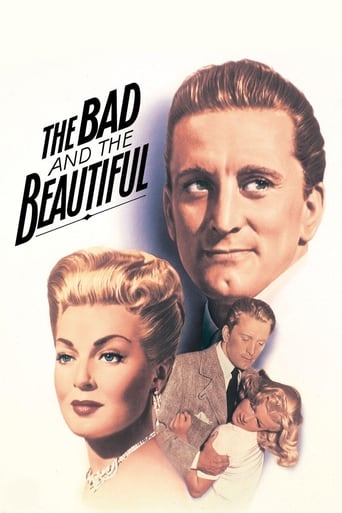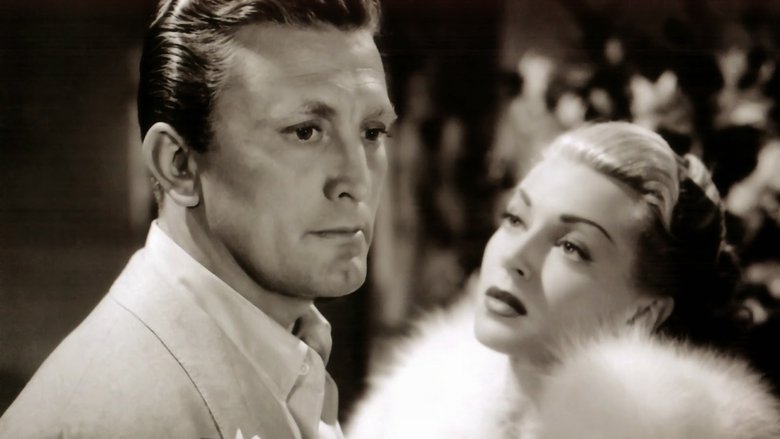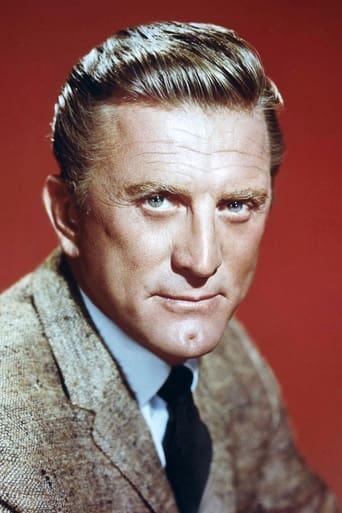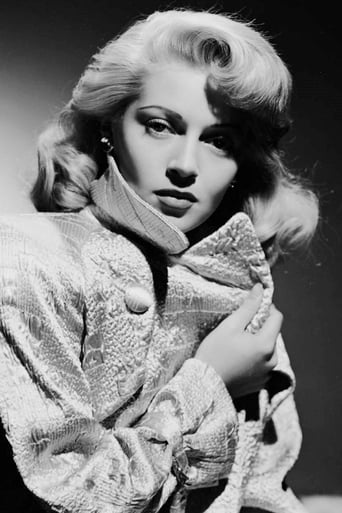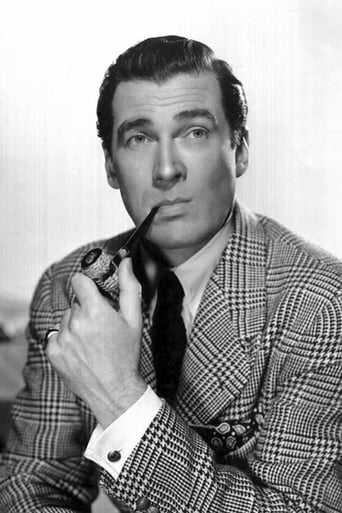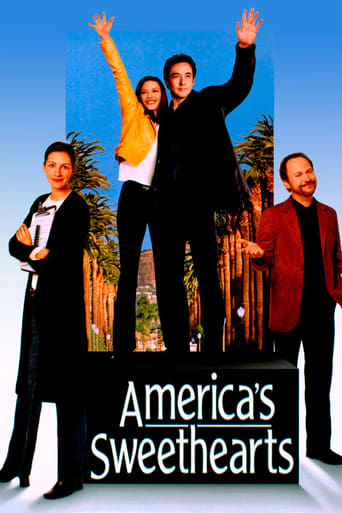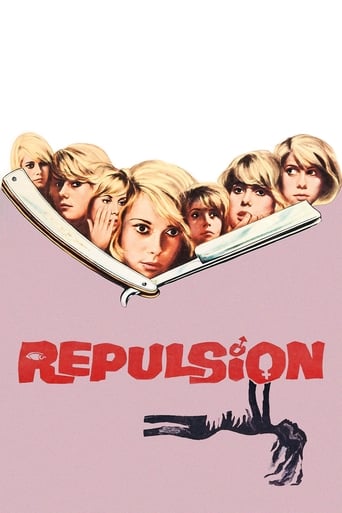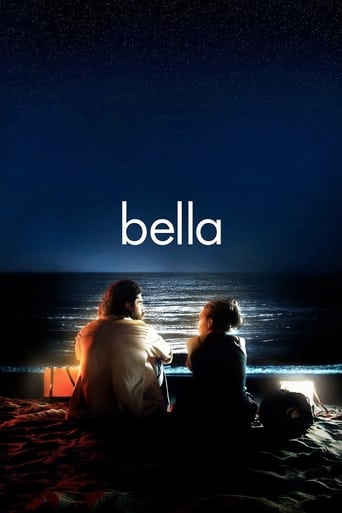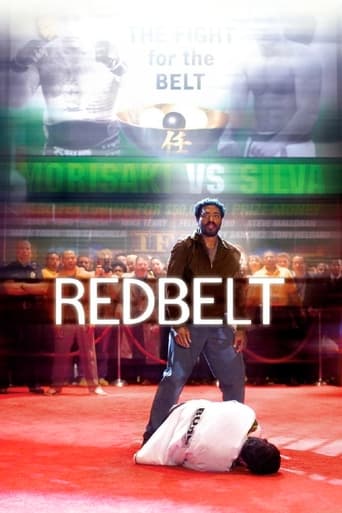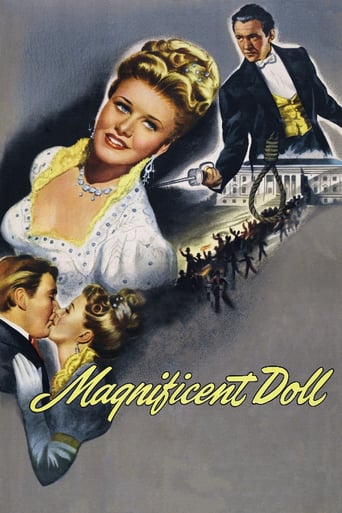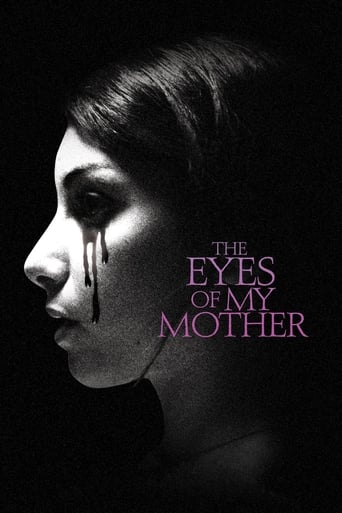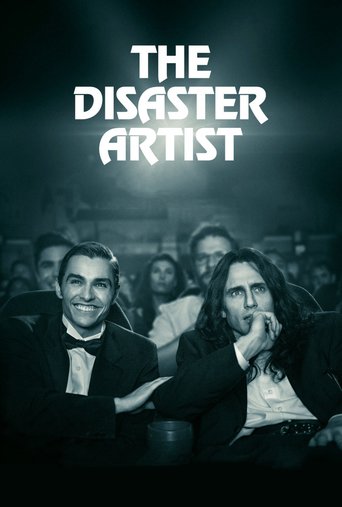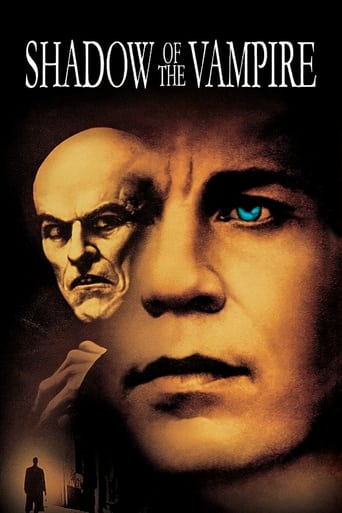The Bad and the Beautiful (1952)
Told in flashback form, the film traces the rise and fall of a tough, ambitious Hollywood producer, Jonathan Shields, as seen through the eyes of various acquaintances, including a writer, James Lee Bartlow; a star, Georgia Lorrison; and a director, Fred Amiel. He is a hard-driving, ambitious man who ruthlessly uses everyone on the way to becoming one of Hollywood's top movie makers.
Watch Trailer
Cast


Similar titles
Reviews
Simply Perfect
Wow! What a bizarre film! Unfortunately the few funny moments there were were quite overshadowed by it's completely weird and random vibe throughout.
There's no way I can possibly love it entirely but I just think its ridiculously bad, but enjoyable at the same time.
Actress is magnificent and exudes a hypnotic screen presence in this affecting drama.
This movie won five Oscars including that for Gloria Grahame as Best Actress in a Supporting Role. Also, Kirk Douglas, perhaps in his prime years, was nominated for Best Actor in a Leading Role. Johnathan Shields (Kirk Douglas) is a Hollywood producer who seem to be very unpopular with three of the people that had worked with him in the past. They all refuse his phone calls to make another movie with him. When his co-producer, Harry Pebbel (Walter Pidgeon), calls them into his office to beg them to work with Shields again, their experiences with him are presented as flashbacks. In the first flashback, Fred Amiel (Barry Sullivan) is a want-to-be director who meets Shields at Shields' father's funeral. Both are broke and have to work together on bad B movies before they are able to strike out together to make the kind of movies that they want.In another flashback, Shields discovers Georgia Lorrison (Lana Turner) when she is a depressed alcoholic who hate the memory of her father, but can't seem to get beyond it. After Shields shows her that he believes in her by giving her screen tests, promoting and coaching her, and supporting her when she relapses into an alcoholic binge before her acting debut, she becomes a success. In the third flashback, Lee Bartholw (Dick Powell) is a college professor—an academic novelist—from Richmond, Virginia. When Shields discovers one of Barthlow's novels; he asks him and his wife, Rosemary (Gloria Grahame), to come to Hollywood to 'help' turn his novel into a movie script. After the couple comes to Hollywood, they never return to Richmond. In each of the flashbacks, masterfully presented as separate stories, Shields is a very supportive mentor and friend. So, why do they all hate him so much? Because he is tough to work for and demands more than they can give? In this rags-to-riches-to-rags story, Shields is far from a perfect person. Some even see him as 'a user.' However, when the three principal characters recount their experiences about him, it is really had to convince the audience—much less the characters—that he is not basically a good-hearted person. This is an entertaining movie, often described as 'a hard-hitting expose of Hollywood's tough look at itself.' If it is, in Vincent Minnelli's hands, its bark is worse than its bite. And, its neat three-in–one structure is cleverly woven to make the movie's whole larger than the sum of its parts. However, this structure was not original, it had been used by Joseph L. Mankiewicz in A Letter to Three Wives (1949), also featuring Kirk Douglas.
In Hollywood, director Fred Amiel (Barry Sullivan), movie star Georgia Lorrison (Lana Turner), and screenwriter James Lee Bartlow (Dick Powell) each refuse to speak by phone to Jonathan Shields (Kirk Douglas) in Paris. Movie producer Harry Pebbel (Walter Pidgeon) gathers them in his office and explains that Shields was calling them because he has a new film idea and he wants the three of them for the project.I suppose Vincente Minnelli may be known for musicals, such as "Meet Me in St. Louis". Today (2016) he is probably better known for his marriage to Judy Garland and being the father of Liza Minnelli more than for his own work. A shame, especially given this one.Look at this cast: Douglas, Turner, Pidgeon... and the way they interact. The movie was big in its day, at least in part because it was a guessing game who the characters were based on. Now, we know for certain that "Cat Men" is obviously "Cat People"... but that does not make Douglas a version of Val Lewton...
Harry Pebbel (Walter Pidgeon) tells James Lee Bartlow (Dick Powell), Georgia Lorrison (Lana Turner), and Fred Amiel (Barry Sullivan) that their mutual former friend, the hated producer Jonathan Shields (Kirk Douglas), wants to produce a new movie with the their help. On his own, Jonathan couldn't raise a nickel anymore. The movie flashbacks as each one of them recount their lives with the scheming Jonathan. Director Fred Amiel meets Shields when he put on a funeral for his loner father. They rise together as Shields schemes to get producer Pebbel to hire them. However, Shields would eventually double cross him taking away a movie to a bigger director. Beautiful star Georgia Lorrison started off as a hungry bit actress haunted by her late great father. Her life is a drunken mess and Shields confronts her. Under his nurturing care, she becomes a big star and she falls for him. However he rejects her possessiveness and tells her that he was just handling her after catching him with another woman. Bartlow was a small college professor who wrote a best seller book. Shields bought the rights and hires him as the screenwriter but his annoying wife keeps getting into the way. Shields hires a gigolo actor to distract her and they run off together getting killed in a plane crash. Shields eventually tells him which he uses to write a Pulitzer Prize winning book. All three have grudges but Pebbel points out that Shields made each one of them into the stars that they are today.The big guessing game is what each one of these characters are based on. That's half the fun of this movie. Without that, this is a solid melodrama. The splitting of the movie into three does take away the flow. Sometime around the third section, I lost a little bit of interest. I think it started with the overzealous acting at the end of Lana Turner's section. I would have switched the order of the three sections since that confrontation seems to be so climatic with the writer being second and Lana Turner being the last. After the Douglas and Turner blowup, there's nowhere for the movie to go except to wrap up.
Lana Turner abandoned developing her talent into becoming a good actress early in her career when still a teen-age starlet. Here a mature Lana puts out her usual wooden performance, an actress always acting, always conveying to the audience that she is Lana Turner, Sex Goddess and Movie Star. Kirk Douglas is fierce and dictatorial, a character type he excels at and could probably play in his sleep. Dick Powell is a bland presence in every movie he's in. Walter Pigeon is in it too. Aren't he and Melvyn Douglas the same person? Barry Sullivan, a competent B movie actor, has a role. Gilbert Roland is thrown in for effect to represent the generic Latin Lover female moviegoers traditionally swoon over. Gloria Grahame shows up too, always the "dame," in this case a Southern belle one fluttering and flitting all over the place; and the Academy honored her with a Best Supporting Actress Oscar for 1952!That takes care of the cast. As for the story, well it's supposed to be an inside look at Hollywood wheelers and dealers, star making, and breaking, glory takers and those on the down escalator to failure. It's the real story, exposed! Wrong. It is so full of clichés and tired old tropes, stereotypes--- everything that the public anticipates and comfortably accepts in a fictionalized story purported to be drawn on "real life" events and people. All the soap opera melodrama bursts out of it everywhere making scenes meant to be taken seriously more like comedic spoofs from Saturday Night Live. And the Academy honored this with a Best Screenplay Oscar for 1952!The weepy, poignant musical score by David Raksin serves as the baleful icing dripping off this collapsed cake. To say that this is not director Vincent Minelli's best effort is an understatement. He made a lot of good movies. This should be relegated to the bottom of the heap.

